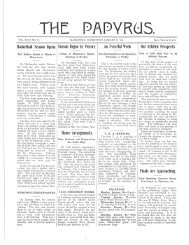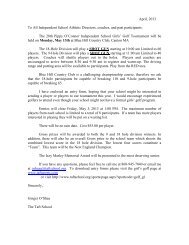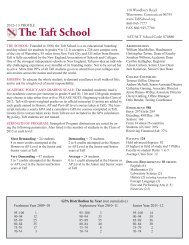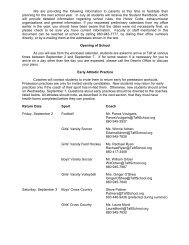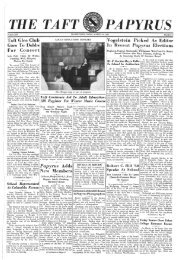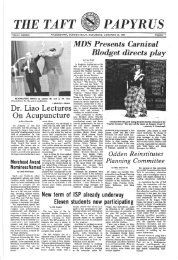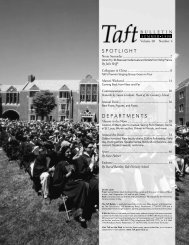By Lauren Henry '99 - The Taft School
By Lauren Henry '99 - The Taft School
By Lauren Henry '99 - The Taft School
- No tags were found...
You also want an ePaper? Increase the reach of your titles
YUMPU automatically turns print PDFs into web optimized ePapers that Google loves.
S P O T L I G H Testeem of girls can be preserved evenin a co-ed setting.Ideally, confidence in the classroomwould allow girls to be moreassured in all areas of life. Unfortunately,this is not realistic. While co-edschools and single-sex schools canprovide girls equal confidence in academicsand perhaps athletics, girls atsingle-sex schools do experience extraleadership opportunities that generateincreases in self-esteem.Unfortunately, even the single-sex atmospheredoes not guarantee that girlswill maintain their self-esteem throughoutadolescence. <strong>The</strong>re are simply toomany influences on a girl to protect herfrom a loss of self-confidence. Whetherthe negative message comes from family,friends, teachers, or the media,it will be received.Rather than try to preventa girl’s loss of self-esteem,it may be a more realisticgoal to be prepared to renewher self-esteem onceit has been harmed. Althoughthe girls Iinterviewed couldall name timeswhen they sufferedfrom low self-esteem, theyhave each recovered and are now enjoyinggreater confidence. A girl who issurrounded by encouraging teachers,non-judgmental peers, and a supportivefamily should be able to overcome herfeelings of inadequacy, allowing herto become an articulate, independent,and self-confidentwoman.For further readingBrown, Lyn Mickel, andGilligan, Carol. Meeting atthe Crossroads, 1992Kopecky, Gini. “<strong>The</strong> Age ofSelf-Doubt.” WorkingMother July 1992:46-49.Pipher, Mary. RevivingOphelia: Saving the Selves ofAdolescent Girls, 1994.<strong>Lauren</strong> <strong>Henry</strong> began work on eating disordersand self-esteem in girls as part of hersenior seminar at <strong>Taft</strong>. She is now a freshmanat Middlebury College in Vermont.What Can We Do?Recognizing that there are self-esteem issues for all adolescents,and some that are particular to young womenaway at boarding school, the headmaster has supportedthe launch of a variety of programs. Some have been inplace for several years; some are in the planning stages andwill become part of <strong>Taft</strong>’s programming this year.Since 1994, <strong>Taft</strong> has been consulting with SuzanneHenrick, a registered nutritionist whose field of expertiseis the treatment of eating disorders. She is available oncea week to students and faculty for confidential consultationeither by appointment or in a drop-in basis. She workswith coaches to present to various teams, and consults withthe dining service as well. Her presence on campus hasmade an enormous difference in our ability to recognizestudents in trouble early and to establish the appropriateplans to improve the situation.Class deans and advisors are constantly evaluating theemotional well-being of students, and using the school counselor,the consulting school psychiatrist, and outsidetherapists to intervene when appropriate. Concerns raisedby dorm faculty, coaches, or classroom teachers are addressedby class deans in conjunction with appropriate others.<strong>The</strong> Mid forum program offers tenth graders the opportunityto discuss social and personal issues that arechallenging that particular group. Teachers facilitate discussions;however, the students play an active role indeciding what topics are most pressing. Gender difference,health, and self-esteem are always in the dialog fromthe moment the semester begins.Lisa Keys, physician’s assistant, has been hired in thehealth center to add another expert perspective to our faculty.Students have already begun to seek her out to askquestions and express concerns of a personal nature. Herexperience with adolescents in boarding school will nodoubt prove to be invaluable as we develop new ways toreassure and counsel our students.A new program—“Chat Room”—will open by theend of this semester. A sitting room in the back ofCruikshank dorm has been filled with books, videos, andother sources of information on topics of specific interestto adolescents. <strong>The</strong> room will be staffed in the evening sostudents who want to talk with a trained peer or a counselorcan stop in any evening. A formal presentation anddiscussion on a particular topic will be hosted in the ChatRoom every other week. <strong>The</strong> presentation series will includetopics such as stress reduction, depression, andhomophobia, among others.Finally, the on-campus counselor is available every dayfor faculty members and students to stop in to discuss anyissue that is a difficult one to manage.—Jean Strumolo Piacenza ’75, school counselor14 Fall 1999



